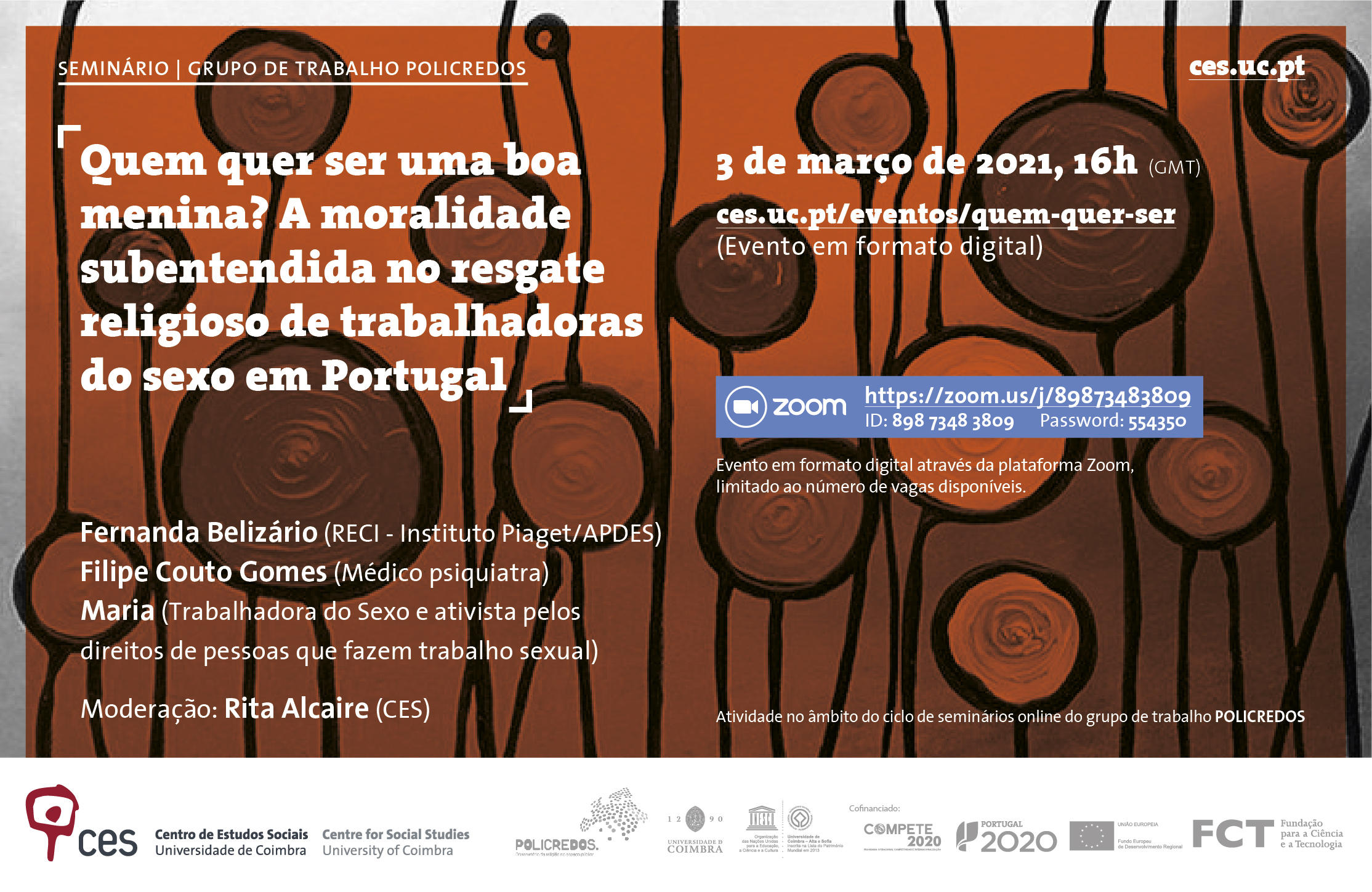POLICREDOS - Religions and Society
SEMINAR | POLICREDOS WORKING GROUP
Who wants to be a good girl? The morality implied in the religious rescue of sex workers in Portugal
Fernanda Belizário
Filipe Couto Gomes
Maria
March 3, 2021, 16h00-18h00 (GMT)
Online event
Moderator: Rita Alcaire (CES)
About
Certain conservative discourses have gained expression by anchoring themselves in what they call gender ideology, a supposed conspiracy to question traditional family values and instil the normalization of sexual identities or orientations that these groups consider unnatural or illegitimate. Loaded with fake news and distortions of consolidated theories and studies, especially within queer studies and feminism, these conservative discourses are particularly visible at school, defending the right of parents to prevent issues related to sexual and/or gender diversity from being addressed there according to an alleged higher interest of the child. In other fields, they have opposed various agendas for rights and recognition, such as struggles for the recognition of sex work as work.
Religious-based organisations have been very successful in raising funding and attracting public interest and political influence by capitalising on moral panic discourses. As a consequence, they sustain moralistic imaginations about sex and sexuality, such as the overlapping of sex work with human trafficking, and gain strength by joining abolitionist feminist currents. Moreover, the interpretation of religious-based organisations and their leaders also plays an important role in the political and media agenda. Such discourses and modus operandi of "providing assistance" to sex workers have a considerable impact on their human rights, such as access to justice, health, legal documents, housing and respect for their gender identity.
In this conversation we intend to address religious morality as an axis of interpretation of sex work and sex workers, and from that, to think about the repercussions of this understanding on the lives of these women. The intention is to reflect on how religious discourses inform the work of religiously based outreach organisations with sex workers, the media landscape and the political agenda in Portugal and, more broadly, moral understandings about sex work.
Bio notes
Fernanda Belizário - PhD in Postcolonialisms and Global Citizenship from the Centre for Social Studies of the University of Coimbra with a thesis on Brazilian transvestites migrant sex workers in Europe, from a postcolonial and queer perspective. She is an integrated researcher at the research centre RECI (Research Education and Community Intervention) of the Piaget/APDES Institute. She is project manager at European level in the area of risk reduction and Policy & Advocacy Officer in the area of advocacy for the rights of people doing sex work. She holds a Master's degree in Communication and Consumption from ESPM-SP and a degree in Social Sciences and Communication, both from the University of São Paulo. Her research interests are gender studies, theoretical extensions of post-colonial and decolonial studies and migration.
Filipe Couto Gomes - is a psychiatrist, MA in Medicine from the University of Porto with a dissertation on clinical monitoring in gender transition (2011). Conducted specific training in Psychiatry at the Centro Hospitalar Psiquiatrico de Lisboa, maintaining collaboration with its Clinical Sexology Consultation. Post-graduate in Sexology, by ISPA, and in Social and Cultural Psychiatry, by the University of Coimbra. Collaborates with several community mental health projects, aimed at LGBT+ youth and adults, people living with HIV and people sex workers.
Maria - Sex Worker and Sex Worker Rights Activist / Sex Workers Movement and Partilha d’a Vida Group
Moderator
Rita Alcaire - Postdoctoral Researcher (Democracy, Citizenship and Law Research Group). Research Fellow for the Portuguese team of CILIA LGBTQI+ Comparing Intersectional Life Course Inequalities amongst LGBTQI+ Citizens in Four European Countries, funded by FCT (via NORFACE). She holds a PhD in Human Rights in Contemporary Societies(CES / III) with the thesis 'The Asexual Revolution: discussing human rights through the lens of asexuality in Portugal', which analyses narratives about asexuality by health professionals, media and asexual people, with the purpose of challenging and rethinking the notion of human rights. Co-coordinator of Social and Cultural Psychiatry MA (Faculty of Medicine), she has developed outreach and advocacy activities in this area of expertise. She is part of the organization of the advanced training cycle Publish do Not Perish - Survive the Stampede and of SHARP Talks- Sexuality, Health and Human Rights, at CES. Her research interests focus on the study of gender and sexualities, mental health and pop culture, using different media as a privileged way to engage with them. Most significant publications include the chapters 'Asexuality as an Epistemological Lens: An Evolving Multi-Layered Approach '(SAGE, 2020), 'Disavowing psychiatry: activism, health policies and health as a political act' (IUC, 2020) and 'The asexual community discusses its struggle tp find acceptance'(EDUEL, 2019).
_____________________________________________
This activity will be accessible through the Zoom platform and will be limited to number of available places:
https://us02web.zoom.us/j/89873483809?pwd=ZGxVWEJhTlVwd0ZTd0RIK0pNejBhZz09
ID da reunião: 898 7348 3809 | Senha de acesso: 554350
We appreciate that all participants keep the microphone muted until the moment(s) of debate. The host of the session reserves the right to expel the participant who does not respect the rules of the room.
Online open access activities such as this one do not grant a declaration of participation since such document will only be provided in events that provide for prior registration and controlled access.


